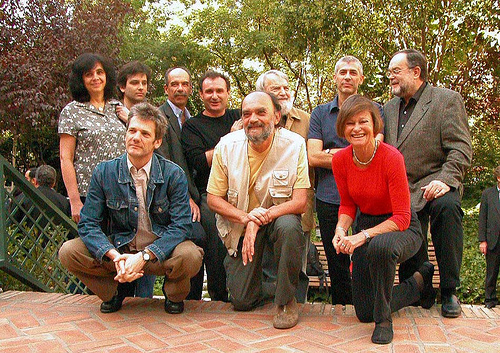The Crisis of Writer’s Block
by Horacio Castellanos Moya and translated by Sam Cogdell / December 6, 2012 / No comments
The return of Liliana Heker after 10 years of writer’s block.

Liliana Heker with other Argentinian writers in 2004. Liliana is at the bottom right. Photo: Casa de América.
A few days ago, I watched a YouTube video of an interview with the excellent Argentine short-story writer Liliana Heker. The 2011 interview was about the publication of her book of short stories, La Muerte de Dios (The Death of God), after a ten-year hiatus. She claimed that the extended silence was not because she didn’t want to publish anything, but because she was not able to write during that time. She was blocked, or, as Uruguayan short-story writer Horacio Quiroga put it, she had lost “the hunger” to tell a story.

- Corkscrew is focused on Latin American issues. Literature, journalism and politics are the main concerns of this column. A corkscrew is useful only if it opens a bottle, hopefully full of something that would enlighten our spirits, but we could also set loose a cruel Genie or a rotten wine. The author will follow this principle: look for topics that open debates, new perspectives, and controversy. Cheers!

- Horacio Castellanos Moya is a writer and a journalist from El Salvador. For two decades he worked as a journalist in Mexico, Guatemala, and his own country. He has published ten novels, five short story collections and two books of essays. He was granted residencies in a program supported by the Frankfurt International Book Fair (2004-2006) and at City of Asylum/Pittsburgh (2006-2008). In 2009, he was a guest researcher at the University of Tokyo. Currently he teaches at the University of Iowa.
Being blocked, or unable to write, is something that most of us writers have suffered from. It creates anguish, doubts about what it means to write, and fears that the creative impulse has been lost forever, or that the raw material for telling stories has dried up. Of the many writers who have confronted this problem, most of them say the best thing to do is persevere with the certainty that “the juice will return.”
Ten years is a very long time, of course, and it would require an enormous capacity for resistance to bear that burden without falling into a well of depression or self-destruction. That’s why I was interested in Heker’s reflections.
She says that writers generally confront the crisis of writer’s block in one of two ways. The first is unconscious: Without realizing they’re in crisis and without facing the problem, they dedicate themselves to writing repetitive works that add nothing to what they’ve already done, producing works that are not only minor, but unnecessary. The second way is to acknowledge the crisis head on, through the bravery of silence, and also of reflection, knowing full well that they’re in a risky situation, but also that they will not get out of it through the escapism of empty, repetitive writing that would turn them into hacks.
Another of Heker’s interesting reflections had to do with the cause of her block, or, as she calls it, her ten-year “crisis.” It was her dedication to teaching creative writing workshops for so many years that blocked her, since her energies had been focused on reading, thinking, and editing the work of her students, among whom are several of the most outstanding young writers of Argentina. She has no regrets about this, and calls it a “marvelous” experience.
But Heker, as she explains, was only able to begin writing again after she stopped teaching creative writing workshops, took a year’s sabbatical, and found her “triggers”– that is, the motivations that allowed her to return to her true calling, the writing of stories.
Of course, Heker’s experience is very personal. Great writers have been able to combine teaching workshops and writing their own work, without slighting either of the two. Mentioning them all by name would turn this column into a telephone directory. But in any case, for those of us who at one time or another have dedicated ourselves to teaching creative writing seminars, Heker’s reflections shouldn’t fall on deaf ears. It will be smart to remember that it could happen to you.




